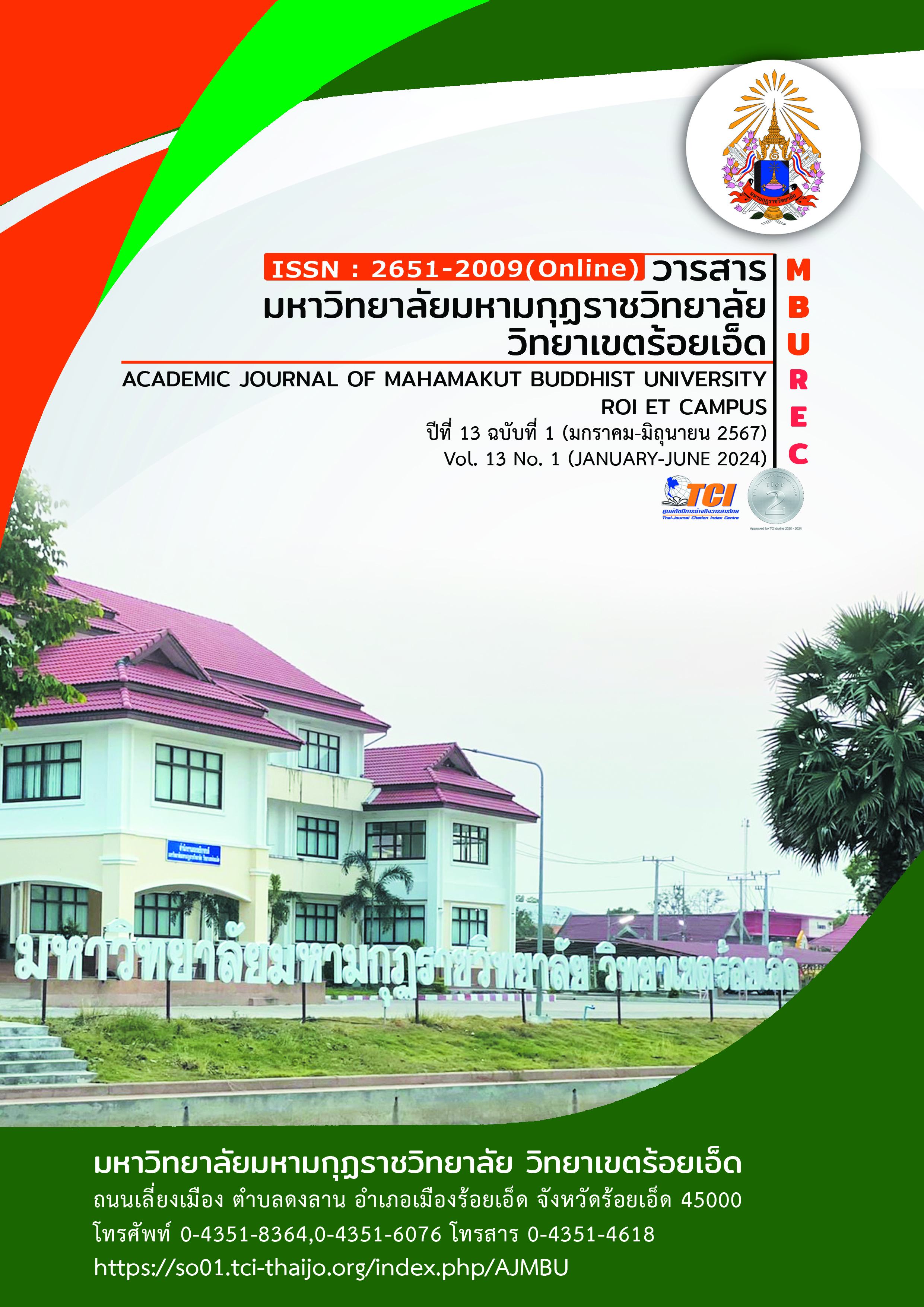AN APPLICATION OF THE FOUR PATHS OF ACCOMPLISHMEMT IN MANAGEMENT OF ADMINISTRATIVE ORGANIZATION OF PHON NGAM SUBDISTRICT IN NONAHAN DISTRICT, UDONTHANI PROVINCE
Main Article Content
Abstract
The objectives of this research are (1) to study the 4 principles of Iddhi in Theravada Buddhism, (2) to study the management problems of Phon Ngam Subdistrict Administrative Organization, Nong Han District, Udon Thani Province, and (3) to apply the principles of Iddhi. Baht 4 for the management of Phon Ngam Subdistrict Administrative Organization, Nong Han District, Udon Thani Province It is qualitative research. The sample group used in the research included monks, leaders of the Subdistrict Administrative Organization, officials, and the public, totaling 25 monks/people. The research tools included interviews. Descriptive data analysis was analyzed.
The results of the research found that 1) The 4 principles of Iddhipāda in Theravada Buddhism are found to be the foundations of success: 1. Chantha means love, satisfaction with what one has or what one does. 2. Viriya means diligence and Continuous diligence. 3. Chitta means being attentive, determined and responsible for things. 4. Vimansa means being aware and pondering cause and effect with wisdom 2) There are 9 areas of development policy: 1. Institutional protection policy 2. Educational policy 3. Economic policy 4. Infrastructure policy 5. Disaster prevention and relief policy 6. Public health 7. Policy on safety of people's lives and property 8. Policy on natural resources and the environment 9. Policy on public participation and 3) is an integration of project activities of the Phon Ngam Subdistrict Administrative Organization. of the community and of the temple to be one by integrating all matters related to art, culture, traditions, rituals, local wisdom in order to create unity in participation between the government sector, namely the leading municipalities community The temple will invite people in the area to participate in the process of managing various activities In order to be successful in giving alms Used in living life in order to be successful in life, which will promote the development of the quality of life in the Buddhist way happily and sustainably.
Article Details

This work is licensed under a Creative Commons Attribution-NonCommercial-NoDerivatives 4.0 International License.
References
กรมส่งเสริมการปกครองส่วนท้องถิ่น กระทรวงมหาดไทย. (2547). พระราชบัญญัติสภาตำบลและองค์การบริหารส่วนตำบล พ.ศ. 2537 แก้ไขเพิ่มเติมถึง ฉบับที่ 5 พ.ศ. 2546. กรุงเทพมหานคร : โรงพิมพ์ประสานมิตร จำกัด.
กิตติ กรวัชรกิจ. (2565). การประยุกต์หลักอิทธิบาท 4 เพื่อการจัดการในการพัฒนาวิสาหกิจชุมชน. วิทยานิพนธ์พุทธศาสตรมหาบัณฑิต สาขาวิชาพระพุทธศาสนา. บัณฑิตวิทยาลัย : มหาวิทยาลัยมหาจุฬาลงกรณราชวิทยาลัย.
กัญก์วฬาภรณ์ กลิ่นนิ่มนวล. (2560). ประสิทธิภาพการบริหารจัดการสำนักงานจังหวัดพิษณุโลกตามหลักอิทธิบาท 4. วิทยานิพนธ์พุทธศาสตรมหาบัณฑิต สาขาวิชาพระพุทธศาสนา.บัณฑิตวิทยาลัย : มหาวิทยาลัยมหาจุฬาลงกรณราชวิทยาลัย.
ติน ปรัชญพฤทธิ์. (2560). ศัพท์รัฐประศาสนศาสตร์. พิมพ์ครั้งที่ 6. กรุงเทพมหานคร : สำนักพิมพ์จุฬาลงกรณ์มหาวิทยาลัย.
พระมหาสุเมธ สุจิตฺโต (สามารถกิจ). (2560). การพัฒนาสมรรถนะด้านวิชาการตามหลักอิทธิบาท 4 ของบุคลากรทางการศึกษาโรงเรียนพระปริยัติธรรม แผนกสามัญศึกษา กลุ่มที่ 1 กรุงเทพมหานคร. วิทยานิพนธ์พุทธศาสตรมหาบัณฑิต สาขาวิชาพระพุทธศาสนา. บัณฑิตวิทยาลัย : มหาวิทยาลัยมหาจุฬาลงกรณราชวิทยาลัย.


